Geof Huth's Blog, page 24
August 15, 2011
The Heat from It
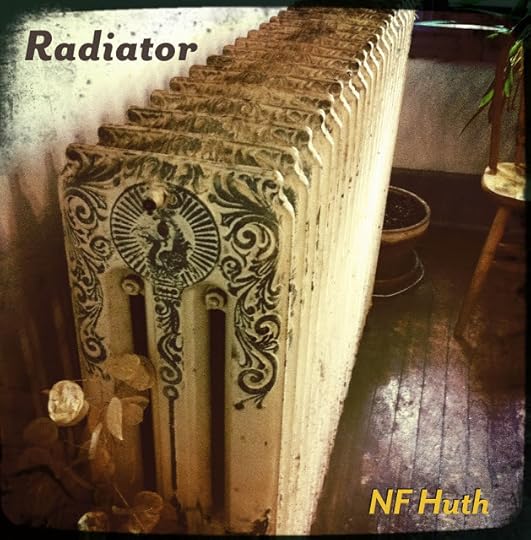
We are born into biases and through our biases we see everything on a slant. Our thoughts slope down into unavoidable and irredeemable space.
I am compelled to announce this at the onset because I will be saying some words that may seem kind, but which I see merely as factual, about a book of poetry. Yet it is not just any book. It is not a book that is somehow anonymous to me and which I must learn to accept into the marrow of my bones. It is a book made out of that marrow, a book by my wife Nancy, a book designed (I herewith admit) by me, a book that I saw created poem by poem, each clawed out of the think clay of a life I shared with Nancy, each filled with more imagination than my veins are filled with blood. A book called Radiator. So I may exhibit biases here, but I think I have enough of an ear to detect the work of someone who has an ear, and I am surprised by what Nancy does, even something as simple, or simply impossible as
iris maple bird's eye pear we are dust
which is a line from the book, yet more importantly a line to me. And the book includes a thank-you to me as well, so I can't pretend I'm not personally connected to the book.
Yet let me think through the book for a few moments.
Nancy surprises me by always being the poet no-one else can be. She is not simply a lyric poem of the all-seeing I, though she sometimes writes from that perspective and though her life intervenes in these poems. She is a poet whose language is so unique that she reminds us the language we are using every day. Her vocabulary is decidedly Anglo-Saxon, focused on monosyllabic clumps of sound almost unique to English, words like "clump," "scrunched," "squint," and "click." Yet her vocabulary is restless, imaginative. She drags a wide net behind her, so she can pull all the words close to her and use them as she can.
The way fire
extends a wall
the way syllables are
dropped and days
clapped
and Xed
just
to make sure
Sometimes the idea
sometimes container
I read over words set in a sequence like this, and I am impressed by their apparent simplicity, by how much information is packed into them, by how the lines break tells us how to think about them, by how this is a voice, a real human voice speaking to us, but one that is heightened, the vibrant voice of a person alive and thinking and speaking out as if she were actually a real person and not just the voice of a poem.
Sometimes hers is a humorous voice:
when grey cartoony fingers
poked again into the many
oozy spots of her house
drawing themselves a chair
at her dining room table
squeezing into her morning shower
making her thoughts slippery
as soap or
nuzzling into her bed
it was a bit
too much.
Still, you can always hear the way sounds work their ways through her poems, how their jagged metrical patterns give rise to unexpected meaning, how she plays with the voice she has put in our heads. Listen to how the oo's that open this snippet from a poem list into the z's that finish the poem off and merge with the s's to be the sounds of her morning shower. Whoever that "her" refers to.
Her poems are contraptions of sound and she plays them as someone else might sing a song, but Nancy is a metaphysical poet, in the end. Hers are poems of thinking, of observation, of thinking again and thinking through, of telling the story that tells us what it all means.
Surveying where she sat
suddenly it all made sense
fixt foot remembering a voice
clear like nutmeg like cut grass like
bare foot on stone
asking as no one else ever did
how do you want it how
do you want me how do you wish
it were?
It is clear that I cannot do these poems any justice tonight, that the pieces I've pulled out of the book are touchstones but they float outside the context of their poems, their contraptions of sounds, so I'm ending this little announcement with the two blurbs that grace the back cover of the book, because these tell much more about the book than I can, than I have, than anyone as biased but clear-eared as me can do.
Nancy Huth's Radiator is a fiercely stubborn book comprised of precisely realized palimpsests and composite ghosts. Quotidian in its impetus, working out from the worries and delights of everyday life, utterly riveting in its fugue-like realizations, this volume limns a domestic metaphysics in situ which is suffused with sadness, wisdom and sense perceptions. Add to that the moments within it that one might want to dance to. I love this book. It's a sleeper bomb. It reads quietly but won't go away. It sticks with you like the tattoo you didn't know that you needed.
—Tom Beckett
NF Huth is a dweller in language—she moves strategically forward making text Huthily hers, an architecture she invites us to inhabit. "I sniff the baseboards for a plan." Words like scrunch, clanking, hissing, pokes, pointy, clacking, stony, squint, squeak—become the small sounds made just before tectonic plates shift. (domesti)Cities made in dust, in partially seen images of the viewed lover in a steamy bathroom shower. These gossamer intangibles of dailyness finally become ours in this book. "Certainly now: this parenthetical life" becomes as important a place for our waking territories as our woken ones. This is a book to hold close.
—Anne Gorrick
These two readers can hear her. And now the rest of us have to.
_____
Huth, NF. Radiator. Laughing/Ouch/Cube/Publications: Chilwell, Notingham, U.K., and Claremont, Calif., 2011. US$16.95/£11
ecr. l'inf.
Published on August 15, 2011 20:49
August 13, 2011
A Work Week's Worth of Fidgetglyphs
After spending most of a week of work in meetings, creating over thirty fidgetglyphs over the course of those days, I returned to my process of creating extemporaneous video essays, this time about these fidgetglyphs and what my making of them says about me.
ecr. l'inf.
ecr. l'inf.
Published on August 13, 2011 19:47
August 12, 2011
Note Date and Time Change of Reading in Chicago in August
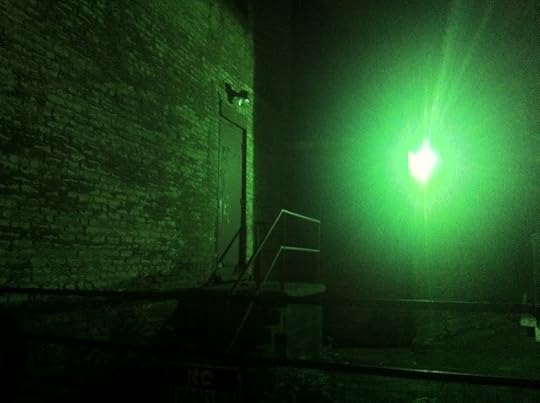
Red Rover Series
{readings that play with reading}
Experiment #49:
Full-Body Poetics
FRIDAY, AUGUST 26th
7:30 pm / doors lock 8:00 pm
**please note change from usual time**
Featuring:
Geof Huth
Steve Roggenbuck
at Outer Space Studio
1474 North Milwaukee Avenue
suggested donation $4
logistics --
near CTA Damen blue line
third floor walk up
not wheelchair accessible
GEOF HUTH writes frequently about poetry, visual and otherwise, at his blog, dbqp: visualizing poetics. His poetry consists of one-word poems, poems written in unintelligible scripts, poems painted onto canvas or assembled within boxes, poems sung and audio- or videorecorded during the moments of their creation, poems created within nature and left to disappear back into it, and even syntactic text separated into lines. Each of his poetry performances attempts to use his entire body fully to examine the possible extent of poetry. His latest book is <i>ntst: the collected pwoermds of geof huth</i>, a book of 775 one-word poems.
STEVE ROGGENBUCK, i started writing in 2006 as a poet, and now i'm not sure if i'm a poet or something else. i am 23 years old and i live in chicago. i grew up in rural michigan and played in a death metal band in high school. i am a vegan and a buddhist. everything i make is available free online, self-published into the public domain. i have two short books: one of msn messenger excerpts set in large helvetica, DOWNLOAD HELVETICA FOR FREE.COM, and one of minimalist plain-text poems, i am like october when i am dead.
RED ROVER SERIES is curated by Laura Goldstein and Jennifer Karmin. Each event is designed as a reading experiment with participation by local, national, and international writers, artists, and performers. The series was founded in 2005 by Amina Cain and Jennifer Karmin.
**UPCOMING**
Experiment #50:
September 24th
Bad Date America - 100 Thousand Poets for ChangeDan Godston, Laura Goldstein, Philip Jenks,Jennifer Karmin, Francesco Levato, Anthony Madrid,Charlie Newman, Larry Sawyer, Don Share, Tony Trigilio,Lina Ramona Vitkauskas & more
TBAExperiment #51:
October 1stEncyclopedia Volume 2 (F-K)Tisa Bryant, Gabrielle Civil,Carina Farrero, Krista Franklin & John KeeneExperiment #52: November 6thSmall Press Publishing ForumCharles Alexander, Patrick Durgin & Susan M. Schultz
Email ideas for reading experimentsto us at redroverseries@yahoogroups.com
The schedule for events is listed athttp://groups.yahoo.com/group/redrove...
WOW WOW WOW
Red Rover Serieson facebook? why not?
<i>ecr. l'inf.</i>
Published on August 12, 2011 19:00
August 8, 2011
Reading in Chicago
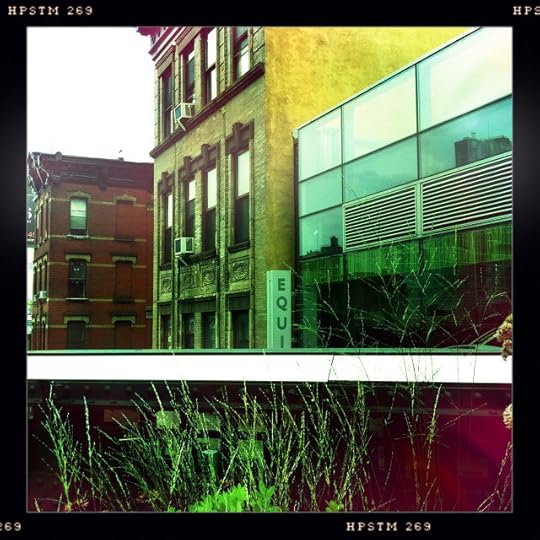 Geof Huth, "EQUI" (6 August 2011)My next reading and performance of full-body poetry will be a part of the Red Rover Reading Series, which is for readings playing with reading. Since that is what my readings do, I think it is perfectly appropriate for me to read there. Here are the details:
Geof Huth, "EQUI" (6 August 2011)My next reading and performance of full-body poetry will be a part of the Red Rover Reading Series, which is for readings playing with reading. Since that is what my readings do, I think it is perfectly appropriate for me to read there. Here are the details:If you'll be in Chicago at that time, because you live nearby or will be attending the Society of American Archivists meeting that will be ending that Saturday afternoon, please stop by to enlarge the crowds and enjoy some poetry performance. I can't guarantee you'll enjoy it, but I at least try to keep the audience's attention, surprise a little, and push the boundaries of poetry, and I do it with my entire body in motion the whole time.And here are a couple of links to the Red Rover Reading Series:
Red Rover Reading Series
Geof Huth
Outer Space Studio
1474 North Milwaukee Avenue
(In the Wicker Park Neighborhood)
Saturday, 27 August 2011
7:00 pm
Geof Huth writes frequently about poetry, visual and otherwise, at his blog, dbqp: visualizing poetics. His poetry consists of one-word poems, poems written in unintelligible scripts, poems painted onto canvas or assembled within boxes, poems sung and audio- or videorecorded during the moments of their creation, poems created within nature and left to disappear back into it, and even syntactic text separated into lines. Each of his poetry performances attempts to use his entire body fully to examine the possible extent of poetry. His latest book is ntst: the collected pwoermds of geof huth, a book of 775 one-word poems.
At Yahoo Groupsecr. l'inf.
On Facebook
Published on August 08, 2011 21:42
August 7, 2011
Bleeding Text
Open publication - Free publishing
For a good sense of what visual poetry is doing today, along with a long essay on the taxonomization of visual poetry, though it claims to be not quite that, you could do much worse than the bleed 0.1. Read it above, edited by John Moore Williams and Mara Patricia Hernandez, and enjoy almost 100 pages of textual entertainment.
ecr. l'inf.
Published on August 07, 2011 20:20
August 3, 2011
The First Night of the Boston Poetry Marathon and BBQ
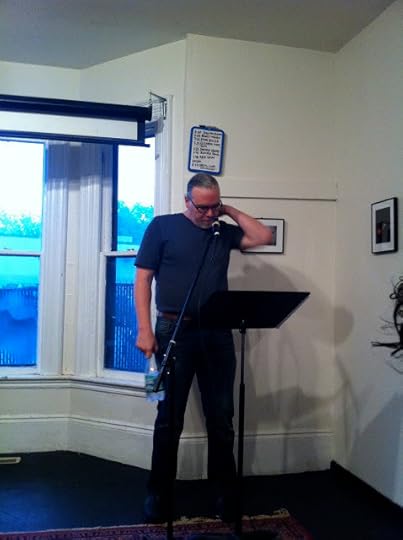 John Mulrooney Opens the Boston Poetry Marathon, Cambridge, Massachusetts (29 July 2011)
John Mulrooney Opens the Boston Poetry Marathon, Cambridge, Massachusetts (29 July 2011)I am attempting, this year, to remember something forth from the Boston Poetry Marathon, because last year I didn't. Allen Bramhall, who made it to last year's event and did not this year (but deposited some criticism of it nevertheless), thought last year that I would turn my extensive notes (two full orange notebooks, handsized) into a detailed report. And maybe I would have if I had had the focus I needed to review and decipher my notes.
Starting, I have to accept that any poetry marathon is a celebration of poetry, an event resplendent with egos, and something other than an exercise in quality. If you bring together almost 100 poets to read over one three-day period at the end of July in Cambridge, Massachusetts, you are going to have to assume that not everything presented will be good or memorable or worthwhile. Sure, but is that the point? To me, the point is endurance. I want to know if I can listen to all those poems and still retain my ability to sift a bit of sense out of the words floating around me. As it turned out. I missed only the last set of poets, the last seven of them, and I apologized to David Kirschenbaum, as I was leaving, for opting to miss his performance. I had hours of driving to do and work to do once I'd made it back.
Truth be told, I'm not a good judge of the quality of spoken poetry, since I cannot take it in adequately well. And I diminished this slack ability by taking notes, photographing people, and even wrawing little fidgetglyphs vaguely influenced by the readings. But I can tell if a performance of a poem is successful, if the poet has taken control of the stage. And this rarely happens because poets are generally intent on getting the words right rather than on providing an experience in which words are only part of the experience.
So I'll continue with scattered impressions of the readings, along with some of the lines I've written down.
Douglas Rothschild and I went to this reading together, heading out from New York's Capital District and driving I-90 most of the way. We arrived late, not being able to leave as early as we might have liked (and having had troubles finding parking in Cambridge), but we entered the reading within seconds of its beginning.
Tonight, I'll review that first, and shortest, day of poetry: Friday, 29 July 2011:
1. John Mulrooney
was reading. His was a poem of simple words and concepts more than images. Surprising observations instead of surprising images, and I'd say that this way of writing is quite common (something I tend to practice). I think but can't confirm that this was his last line:
"the brief illusion you are in this world."
Anything skeptical about mere existence catches and holds my attention. This fascination with reality began as a child, and I cannot put it aside.
2. Bridget Madden
read the words, "You were probably playing with your iPhone," when I was taking a picture of her with my own iPhone 4. My photographs this year are not as good as those from last year, since I didn't take my good camera with me this time. Memorable line:
"It's hard to write without desire."
And I hope so.
3. Kythe Heller
I remember from last year. She took to the stage, a corner of a long narrow room in Outpost 186, wide-eyed and with wild hair. She began by explaining that she has trouble sleeping so year had begun to wander the city (presumably, stately Boston, across the Charles from Cambridge), build small fires and writing poems until the fires died out. The poems she read were all written with this process, and it showed. Many of them had fires within their lines:
"the small twigs wetly smoking"
"the first thing was the burning that was inside the birds"
"because the fire could not be prevented, I wrote this"
"the images of a cairn of dead birds was superimposed on her chest"
But not always.
4. Elizabeth Marie Young
wrote small titleless poems, with lines like
"Touch the touchscreen, Tinkerbell."
Many of the poems read to us this past weekend were infused with technological and pop culture contemporary life. There is one of the tendencies.
5. Danielle Georges
was one of a partial handful of poets who wrote political poems, at least poems of conscience. She herself is Haitian and read a poem entitled "Intersection" about the devastating Haitian earthquake of the not-too-distant past. And she told us she was asked to write a poem about freedom, so she wrote one called "Credence," which she read in English before reading a translation of it in French. From "Intersection":
"The earth shook
A portal opened
I walked through it"
which she repeated many times.
6. Jennifer Tamayo
reported that she had just barely debused from the Megabus in time to make this reading. She read poems in English, but interspersed with Spanish, opening with poems demonstrating her "psychotic take on autobiography":
"We can't masturbate to lakes or trees or flowers"
7. Arto Vann
read a poem entitled "My Father's Sheep Was Never a Blueprint" and, earlier, this line:
"The boarding plank bends from the future"
Many of the poems this weekend were vaguely surrealistic and focused on the contemporary.
8. Cheryl Clark Vermeulen
opened with "Reading Olson in Hospital Waiting Rooms," remarking later that "I think a lot of these poems are kinda fast." Not sure if I really captured this line, but it is pushing its assonance hard:
"Or doing ore would be odd"
9. Lori Lubeski
reminded me a little of Kate Greenstreet in looks, manner, and voice.
"Noise in other houses sounds like noise in your __________ house"
(Sometimes I did not capture every word in the lines I wrote down.)
10. Ryan Gallagherbegan with "Song of Myself," which he described as a version of a Keats poem. He performed it as a rap. And he recited the poem. He did not read it.
"that my soul is the pure parallax of sunshine"
11. Kevin Gallagher
opened by saying that it's "always good to read after my brother," and his poems were much different from his brother's:
"If I knew what you were thinking,
you'd be easy to know"
12. Arda Collins
read a series of numbered poems:
"I heard your thought through ketchup"
"the sunset polevault over a palm frond"
13. Geoff Olson
was the only other person in my row in the audience, so ours was a row of Geoffreys.
"stops regressing, turns the mechanism"
14. Thom Donovan
is, apparently, Dorothea Lasky's husband. He's one of three poets who made reference to archives:
"the archive betrayed us"
though he read about other things as well:
"does the butt, but does it suffice?"
15. Dotty Lasky
received a good deal of pre-applause as she walked up, and it became clear during the weekend that certain locals, or former locals, were favorites and given special attention, which made sense to me. Dorothea read humorous poems humorously, but she had a voice I cannot quite describe. My notes, which may sound harsh, describe "An untuned voice, nasal, aneachoic, unlaryngeal, stentorian," though it seemed a voice appropriate for poems with titles like "I Like Weird Ass Hippies and with lines like
"I love when you rub your patchoulie on me and say, 'I am a man'"
16. Amanda Nadelberg
is one of the handful of poets I forgot to take a photograph of. Multitasking sometimes leads to error. Her poetry may be easily defined by her lines:
"I like you in December, and you're very pretty in March"
"It seems our letters are banned in parts of Georgia"
"I will spit in the face of anyone who says I'm charming"
Of course, I really don't know what her lines are, because Amanda, and really most of the poets, didn't seem to be reading their linebreaks, which I assume they created for visual effects alone. I could have made this point with almost all the poets above. My notes are almost always of single lines of poetry because I couldn't hear the linebreaks. Instead, poets broke their poems into phrases; they followed merely the syntactical structure of the language, leading me to question why so few poets demonstrated an interest in the effects of linebreaks, why they didn't merely write in prose. Maybe some did, of course.
17. Derek Fenner
was the standout this night, because he was the best comedian. He came dressed as and talking as a rural boob in love with the ideas, and the body, of Sarah Palin. His performance came complete with Sarah Palin hand fans and something like a Palin Mass card (copies of both of which I procured), and these included lyrics to a song the audience sang with Derek at the end. His performance consisted primarily of his reading letters he'd written to Palin, at least one of which he'd read at last year's performance. The lines I collected from this performance capture some of the humor of these letters:
"Mexico. That's south of America, and south of that is South America"
"I want to be doused in the blood of gods"
"My Scorpionic tendencies"
By this time in the evening, I was decorated the names of the poets and creating little fidgetglyphs. The one from Derek's reading is one of my favorites.
After the readings, people stood around and talked about going to the bar named The Thirsty Scholar. After a while, though, I noted to Douglas that we needed to go, since I needed to eat. We ate at a nearby Punjabi restaurant and then drove a few miles to our hotel, which is the famous Crowne Plaza that sits, literally, over I-90 just before Boston. We slept over a highway that night, with hundreds of cars speeding under us as we slept.
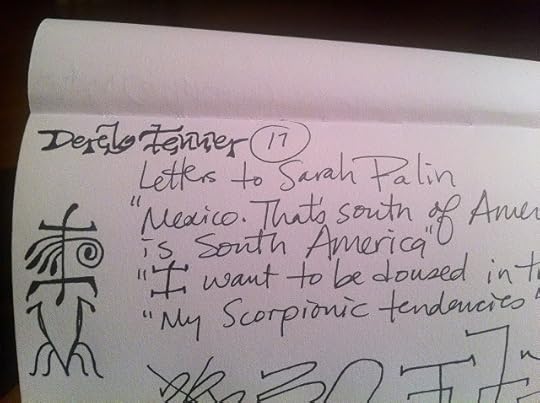 Geof Huth's Notes on Derek Fenner's Reading, Complete with Fidgetglyph (29 July 2011)
Geof Huth's Notes on Derek Fenner's Reading, Complete with Fidgetglyph (29 July 2011)ecr. l'inf.
Published on August 03, 2011 20:21
August 2, 2011
Reading from and Reading To
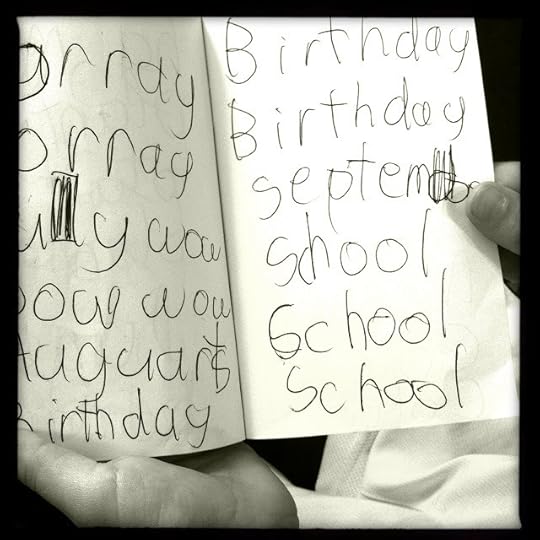 Extract from Abby Cook's Poem "The Twelve Months of the Year" as Held by Abby (Cambridge, Massachusetts, 31 July 2011)
Extract from Abby Cook's Poem "The Twelve Months of the Year" as Held by Abby (Cambridge, Massachusetts, 31 July 2011)I've been back, for the past two days, from the Boston Poetry Marathon and BBQ, a three-day extravaganza of poetry readings, featuring nearly 100 poets, and I was there for all but the last seven of them. The call of the road, the three-plus-hour drive back, encouraged me to leave a little early. Still, I was quite tired from late nights, poor sleep, and last night I fell asleep at 6 pm while reading a book and did not awake until 1 in the morning, at which point I read my book until 3:30 in the morning, finished it and returned to sleep. I cannot be filled with enough words to keep my dreams going long enough.
Any reading, by any poet, makes me consider the act of reading a poem aloud and returns me to my discomfort with it. I make this point with trepidation, but I've made it before. I've gone to many poetry readings, but I feel incapable of taking them in. I find it almost impossible to take in any information in a poetry reading, even a reading of a simple poem. I don't know if it is because the spoken word made a bit ornate or a little crooked (and intentionally so) is just too difficult for me to put together or if there is something in the cadence of a regular poetry reading (something Christian Bök calls Episcopalian in manner) that keeps me from latching onto sense for more than a few lines. Maybe it is that a poetry reading is usually a disjunctive experience of verbal movement but physical stasis. I don't really know.
But the poetic word in flight is uncatchable to me, or usually so. Just as it took me quite a few minutes to finally capture the little bat flying around inside these rooms I inhabit tonight, it takes me a while to capture the sense of a poem. And with a poem, as with a bat, it is easier to catch if not in flight. A bat crawling across the floor or a poem on the page is easy prey. Either in flight is elusive.
I will try, over the next few days, to consider some of the readings I experience this past weekend, but there were so many that it will be difficult. Even my notes are of little help, since they consist merely of descriptions of people's voices and snippets of their poetry that captured my imagination. (Of course, such note-taking cannot be conducive to a solid experience of the poetry reading itself, but I am compelled to capture some notes. And I further degraded my attention by photographing poets as they read and by occasionally capturing audio or video of their performances. So everything I write must be taken in the context of my unacceptable multi-tasking.)
At the marathon, I noticed that most people seemed to be able to take in the poems they heard and make sense of them. They all seemed better at this than I was. It was as if I were aurally dyslexic, unable to make sense of the word unless it were no longer natural, no longer spoken, unless it were fixed in place upon a static plane.
When I helped prepare some of Nancy's students for a poetry reading they'd be giving, I gave them some basic advice. 1. Figure out how you feel comfortable standing. 2. Speak so you can be heard. 3. Read your poems as if you love them. If they are sad, read them as if you love how sad they are. Make them as sad as possible. If they are dense and inscrutable, read them so their words can be understood, so that people can feel their cryptic nature. If they are boisterous, yell them out. This last point means that you have to understand the character of your poems and perform them in a way to support and extend them, to make them real, to make them palpable.
Many poets are quiet readers. And quietness is not necessarily bad, but all poetry can't be quiet. Much might be meditative or cerebral, but some must be emotional or humorous or boisterous. There must be a range to poetry that exceeds the voices we usually bring to it. And I'm looking for a poetry made real, made live. In a reading, I'm looking for a poetry of the body, a poetry wherein the body makes it real. This is a different poem than the subvocalized poem the silently reading mind lifts temporarily off the page. This is a poetry where the lungs and the heart and the muscles encircling bones bring the poem forth.
Why do I want this? Because I want a poetry for the audience, not a poetry for the poet alone. Often poets seem, to me at least, to be reading for their own benefit, to feel a bit of attention, to hear their own words, to feel some accomplishment, rather than to give the audience an experience to move them, to shock them, to make them hear the poem, sure, but also to feel the poem coursing through their bloodstream, to breathe the poems into their bodies.
I believe and I desire a poetry that is a performance, a performance of the body and the mind, a performance of the voice, a simple dramatic experience. I believe in the stage and want a poetry of the stage.
So that is what I attempt myself, and I make no claims to success myself. I am always barefoot in a reading so that I can stabilize myself on the stage. I usually display visual poems, perform a textual poem, and sing an extemporaneous poemsong, because I believe in a range of poetry and I believe that variety helps fight an audience's natural tendency to boredom. I wander the stage, mostly because I don't like being still, but also so the poem seems somehow alive (but I sometimes think I seem more like a caged lion that is unable to be the grand self it desires to be but can never be). I sing or I yell. I usually sing at the end of a reading. And I always leave the stage now and either return immediately to the audience or leave the room, spurning the sound of applause, melting back into the world.
It is, of course, ridiculous to do all of this. I am sometimes, if not always, overly dramatic and given to spectacle over substance, though I am one who sees surface as substance. I am a performer by nature, someone trying to find a way to entertain. Because if poetry isn't entertainment, I don't know what it is. Some entertainment is serious and severely intellectual and some is light and humorous. Poetry can be all these things, and if performed it should make any of these states of being deeply palpable.
And one poet I think did this at the past reading was seven-year-old Abby Cook, who performed with liveliness and beauty her deftly simple, pretty, and humorous poems. More about her and many of the other poets in the near future.
ecr. l'inf.
Published on August 02, 2011 20:28
July 26, 2011
A Reading This Saturday within Readings This Weekend
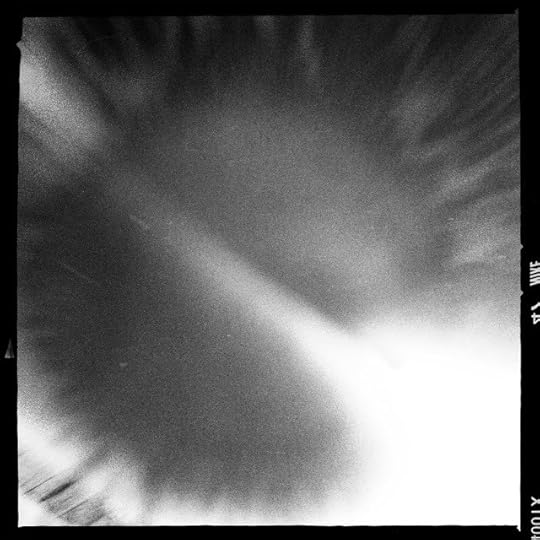 Geof Huth, "Photo from Inside My Pocket" (21 July 2011)
Geof Huth, "Photo from Inside My Pocket" (21 July 2011)Somehow, I had almost forgotten that I am giving a brief reading this weekend: eight minutes in among 88 sets of eight minutes over a period of three days beginning this Friday, July 29th. This is, of course, for the great Boston Poetry Marathon and BBQ (the latter, unexplained, part being potentially the most revealing).
Details on my reading:
Geof Huth
Saturday
30 July 2011
4:28 pm
Outpost 186
186½ Hampshire Street
Inman Square
Cambridge, Massachusetts
(If you make it to 186 Hampshire Street, you'll probably be close enough to find it.)
I'll show a visual poem or two, perform a poem or two, and sing or speak in tongues. The usual stuff, and always poems I haven't read before. But there will be many better reasons to be at this marathon, such as a chance to see many different poets and different kinds of poets in a short time frame. So check out the website of the Summer Poetry Marathon. Admission, they tell me, is free but the hat, they also tell me, will be passed.
Dates and Times:
Outpost 186
186½ Hampshire Street
Inman Square
Cambridge, Massachusetts
Friday, 29 July 2011, 7 pm - 10 pm
Saturday, 30 July 2011, 1 pm - 10:30 pm
Sunday, 30 July 2011, 1 pm - 5 pm
See you there.
ecr. l'inf.
Published on July 26, 2011 13:27
July 22, 2011
Never Bucking the Word
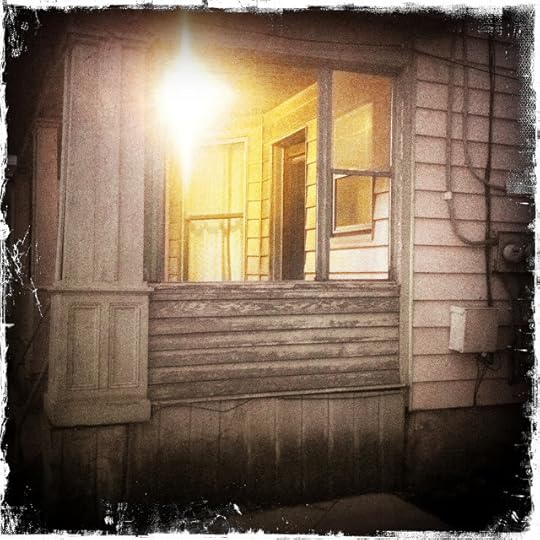 Geof Huth, "Where a Human Might Live in Dilapidated Splendor" (21 July 2011)Some things are inescapable, and what is most inescapablefor each of us is our own self, the body of our being, the inner intellect thatdirects us. Both may degrade, and all do over time, but we can leave those twothings that essentially define us as who and what we are.
Geof Huth, "Where a Human Might Live in Dilapidated Splendor" (21 July 2011)Some things are inescapable, and what is most inescapablefor each of us is our own self, the body of our being, the inner intellect thatdirects us. Both may degrade, and all do over time, but we can leave those twothings that essentially define us as who and what we are.Given this, we are always trapped by ourselves, alwaysexperiencing things as ourselves. The only receptors we have out into the worldare those built into our body. Other devices and other enhancers of perceptioncan become intermediaries between ours elves and what we perceive, but theycannot replace that essential perception, which occurs always within our minds.
For that reason, all art is inextricably tied to the human.Every artform is an expression of the human and a commentary or window on thehuman experiece. Because it is the only experience we know.
Poetry, for instance, is one type of art about and made outof language. It is about letters and symbols and words, but it is also aboutwhat words are: carriers of thoughts and concepts, engines that move ideas outof and back into us. Words are about as human as any thing can be. The visualarts are about visual perception, about the shapes and colors that fill theblack vacancies in the middle of our eyeballs. The visual arts are about thehuman perception of space.
So we are unavoidably human. Replace the parts of our bodieswith metal and plastic, with the hearts of pigs, with stents to keep out veinsopen, and we are still inviolable human beings, as human as someone of nothingbut flesh, blood, bone, and hair. As humans, we are guided by the intellect,but the intellect, the world and matter of thought, is a tricky thing.Sometimes our minds train us to be rational and unemotional, and sometimes ourminds tell us to allow the emotion of the world around us to become palpable,to change us entirely.
In graduate school, Tess Gallagher told me I was thethinking poet, the one whose work was about contemplation (ostensibly, indistinction from emotion). I'm not sure that conclusion was correct, butneither do I believe it was wrong. My work was organized around theconstruction of engines of words, and the enterprise of those engines was toconsider how language could be used. But that, to me, is a human enterprise: topry apart the complexities of language, even simple language, to see thedisorganized structures that many all of our sense (though not all of oursenses).
My poetry was not about sadness or relationships or anythingthat baldly emotional, but I think, still, that there was a wispysentimentality at the bottom of much of it, a cold wind across that landscapeof word, my African harmattan that never quite reached me. And, in thinkingback to those years, now more than half my life ago, I do recall the emotionalin some of the work of my colleagues, like the one woman who used the image of atight wedding ring around her finger to suggest how she was restricted bymarriage (whether she ever truly meant that or not).
I don't think, though I might want it to be true, thatescape from emotion is possible, that the conversion of the human to the Vulcanwould lead to better humans. So many of the least sentimental poets I know arealso among the most emotional in person. By that, I do not mean that they cry,or rend the garments on their chests, nor that they scream at passersby.Instead, they show their humanity, their human frailty, most clearly to me.They demonstrate their fears. They exhibit anger when decrying the use ofemotion in poetry.
Yet the human is inescapable, and it is also emotional.Because emotion is no more than an extension of the intellect, just as the bodyis merely an extension of the mind.
It is within this context that I went to see the documentaryBuck, about Buck Bannaman, the original horse whisperer, theman the character in the novel (which I have never read) is based on, the manwho also served as a consultant on the movie (which I, similarly, have neverseen). So I entered the movie with few preconceptions of the movie, but withsome sense of the emotion of man who suffered a violent childhood to come out theother end a kind and gentle man. And as I walked the 25 minutes to the movietheater, on this hottest of days yet in 2011, I thought about the world ofemotion.
I had, for instance, come out of a day's work, and my workis almost completely of the mind. I am what we call a knowledge worker. It ismeaning and information that guides and is the product of my work. So I work asa bureaucrat, but as an intellectual, as a writer, as a public and privatespeaker, and I work in an edifice of knowledge, within a greater institutionthat is focused on the production and maintenance of knowledge. Yet I wouldfind it impossible to say that my work isn't emotional, and sometimes it isremarkably so. It is a world as I imagine any workplace is, one filled withhappiness, deceit, kindness, real anger, fear, despair, contentment, and everyother strain of emotion that makes up the orchestral music that plays behindthe film that is our life.
So I watched the film, which I'd gone to to escape the heat,and it was touching and funny and sad, and human. At the end of it, I wasalmost relieved to be human. There before me was a man who was fully of thebody and of the mind and of the emotion that flows out of both. His ability totrain an unruly horse was a remarkable feat, one accomplished without anycruelty, with extreme patience, with a light touch, but one learned by thinkingand thinking through emotion, as a human entity must do. And yet it might bewhat I enjoyed most about the film was how well he could ride, how (has he evensaid) the horse had to become an extension of himself, just as everything we domust be an extension of ourselves if we want it to be of any value.
I looked into the face of this man, and there was a softnessborn from a hard life and ruggedness, and created out of long work with his ownpain, the pain of horses (those animals with sad eyes the size of saucers), andthe uncomprehending pain of some of those horses' owners.
In the 1970s, all of which I somehow managed to livethrough, people used the clunky term "self-actualized" to refer to people whohad come to terms with their lives, people comfortable in the skin they hadgrown into, people in balance. And this man Buck seems to have come into thisstate but only after going through a state of extreme unbalance. He had madehimself an extension of himself, just as the horse had become an extension ofhimself.
Just as my words are an extension of myself.
Just as we always must define and give meaning to our ownlives._____
Buck. Directed by Cindy Meehl, 2011.
ecr. l'inf..
Published on July 22, 2011 09:21
July 21, 2011
Is the 'Net Working?
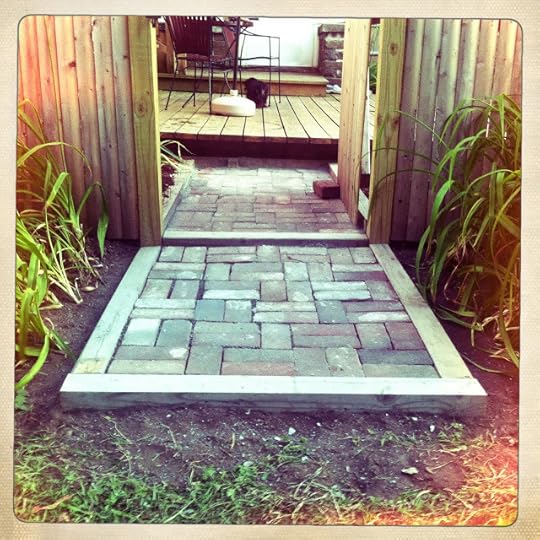
I have been without Internet access for almost a week now, and that will continue for almost another week. (I do have access to the Internet via my phone, but even my skilled thumb typing doesn't make that a good method for writing brief essays.) What this disconnection from the Internet has shown me is that much of my intellectual and artistic life is now web-based.
Which takes me back to the 1980s and the zine Anti-Isolation, put out at the time by Miekal And (before the re-capitalization of his name) and Liz Was (before her second renaming of herself).
Anti-Isolation was an irregular assembling that came out only two or three times (though mIEKAL has plans for another issue), and one issue was focused on networking, in the mailart sense. Anti-isolation was a zine about bringing together poets and artists who were scattered across the continent and the globe but who were of the same ilk. It was that networking that diminished the physical isolation of these artists by enhancing the intellectual connection of them.
In that networking issue, Crag Hill included a visual essay of his entitled "Is the Net Working?" which considered the issues of connecting people intellectually across great distances.
But the net has changed. It is wider now. It is faster. It is immediate. It is deeper. And it has added an apostrophe: 'Net.
The net that ties us together the most these days is the Internet. It allows us to talk to friends anywhere on earth, even friends we've never met. It allows us to write a message to the world, though that world is usually the narrow world we've made for ourselves. Though "narrowness" doesn't imply smallness.
So the reason I feel a general disconnection is because the art of my life is based on this net of connections, one that is held together by the Internet, but one that is greater than that. It is a net of interests as well, and it is a net that exists diachronically as well. I'm am still pulled back to the 1980s when I think about the universe of poetry and art I live within. My processes may be much different now, as are the ways I connect to people in my world, but mine is not a world without a past, not a world ignorant of or dismissive of the past. We in the present know that the future is built upon the past.
What I've also noticed during these Internetless days, which are coinciding with the hottest days of the summer (for a person who lives in a place without air conditioning), is that social media has taken over poetry to a great degree, and that this takeover has blurred the line between poetry (and art) and life. That a person's Facebook wall may be a place for providing insights into or examples of one's own poetry, but that these are also and always venues for displaying one's life. Because one's art is one's life, and vice versa.
This concept of art and life merging is ancient. We have believed for centuries that an artist's art controls to some degree the life that that artist lives. But the merging has increased over time. Maybe first with the Dadaists, whose disregard for the normal conventions of art was coterminous with their disregard for the normal conventions of society in general, making it possible for a Dadaist to live one's art by living in decided contravention of the mores of one's time.
When I think of a life merging with a life, I am returned to thoughts of my friend mIEKAL, who once had a name that seemed proper in conventional Anglophone society. mIEKAL has lived a life, for decades, where his art has infiltrated his life, just as much as his life has infiltrated his life. Just as his house is filled with evidence of his artwork, just as he fights convention (in his sometimes conservation [honestly] way) all the time, so does his non-art life become his art. There is something about his mania for farming that is a work of art: how he tends to 100 or more fig plants and keeps them living and bearing fruit even though he lives in the frigid wilds of Wisconsin. There is something about his interest in growing strange fruits that parallels his interest in outré forms of art. And I recall when he and Liz were growing gourds with which to make their own musical instruments.
Our life is our art or there is no art to it. Whichever "it" "it" is.
A couple of weeks ago, right in the fat middle of an intensive spurt of gardening on my part, I had finished one part of a brick walkway, and I posted a photograph of my handiwork on my Facebook pages. mIEKAL saw that photo and commented that that work was "better than art" (those three words were his entire comment. I responded, "It is art. Note the subtle variation from standard brick patterning." I had to fill a certain form with bricks, I was working with the constraint of certain pre-determined dimensions, and this forced me to solve a problem of how to fill it with bricks, and that led me to an interesting solution to setting the pattern for the bricks. That led to the art. And artmaking, if not art itself, just as poetrymaking vis-à-vis poetry, is about solving problems, and about building things.
I am a builder, and I'm not able to go to my studio as often as I would like, because my studio is the ether, and it is just beyond my grasp for another six days. I am left, for that most part, outside of my world, and I want to return to it.
Because, as George Bailey did, I want to live again.
ecr. l'inf.
Published on July 21, 2011 13:48



